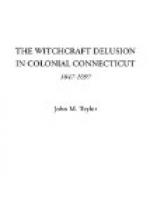“Mris. Dauenport saith, that Mr. Ludlow being at their house, and speakeing aboute the execution of Knapps wife, (he being free in his speech,) was telling seuerall passages of her, and to the best of her remembrance said that Knapps wife came downe from the ladder to speake wth him, and told him that goodwife Staplyes was a witch, and that Mr. Daueport replyed something on behalfe of goodwife Staplies, but the words she remembers not; and something Mr. Ludlow spake, as some did or might ouer-heare what she said to him, or words to that effect, and that she tumbled the dead body of Knapps wife vp & downe and spake words to this purpose, that if these be the markes of a witch she was one, or had such markes; and concerning any promise of secrecy she remembers not.”
“Mr. Dauenport and Mris. Dauenport affirmed ypon oath, that the testimonies before written, as they properly belong to each, is the truth, according to their best knowledg & memory.
“Mr. Dauenport desired that in takeing his oath to be thus vnderstood, that as he takes his oath to giue satisfaction to the court and Mr. Ludlowes atturny, in the matters attested betwixt M’ Ludlow & Thomas Staplies, so he lymits his oath onely to that pt and not to ye preface or conclusion, they being no pt of the attestation and so his oath not required in them.
“To the latter pt of the declaration, the plant’ pduced ye proofe following,
“Goodwif Sherwood of Fairfeild affirmeth vpon oath, that vpon some debate betwixt Mr. Ludlow and goodwife Staplies, she heard M’ Ludlow charge goodwif Staplies wth a tract of lying, and that in discourse she had heard him so charge her seuerall times.
“John Tompson of Fairfeild testifyeth vpon oath, that in discourse he hath heard Mr. Ludlow express himselfe more then once that goodwife Staplies went on in a tract of lying, and when goodwife Staplyes hath desired Mr. Ludlow to convince her of telling one lye, he said she need not say so, for she went on in a tract of lying.
“Goodwife Gould of Fairefeild testifyeth vpon oath, that in a debate in ye church wth Mr. Ludlow, goodwife Staplyes desired him to show her wherein she had told one lye, but Mr. Ludlow said she need not mention ptculars, for she had gon on in a tract of lying.
“Ensigne Bryan was told, he sees how the plantife hath proued his charge, to wch he might now answer; wherevpon he presented seuerall testimonies in wrighting vpon oath, taken before Mr. Wells and Mr. Ludlow.
“May the thirteenth, 1654.
“Hester Ward, wife of Andrew Ward, being sworne deposeth, that aboute a day after that goodwife Knapp was condemned for a witch, she goeing to ye prison house where the said Knapp was kept, she, ye said Knapp, voluntarily, wthout any occasion giuen her, said that goodwife Staplyes told her, the said Knapp, that an Indian brought vnto her, the said Staplyes, two litle things brighter then the light of the day, and told the said goodwife Staplyes they were Indian gods, as the Indian called ym; and the Indian wthall told her, the said Staplyes, if she would keepe them, she would be so big rich, all one god, and that the said Staplyes told the said Knapp, she gaue them again to the said Indian, but she could not tell whether she did so or no.




